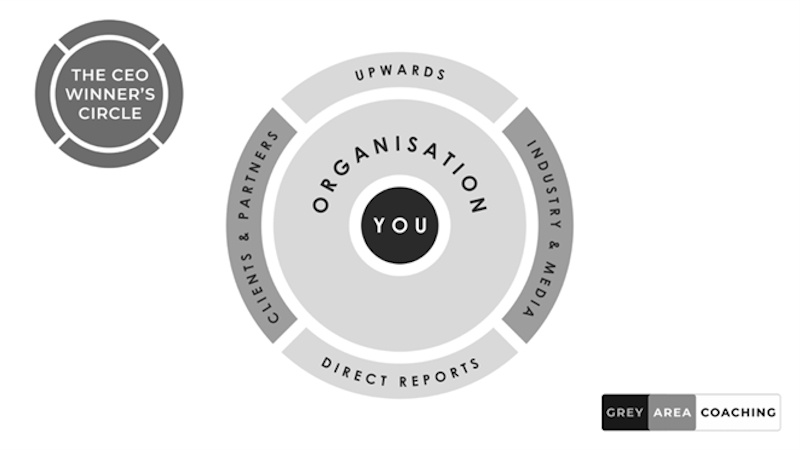Overcoming the stress of leadership

David Roche at Grey Area Coaching offers three essential tips for managing stress as a first-time CEO
In a 2022 Deloitte survey of employees and executives in the US, UK, Canada and Australia, 41% of executives reported "often" or "always" feeling stressed and 40% of executives answered “often” or “always” feeling overwhelmed.
Too often we expect executives to have the answers to every problem and this expectation can be crippling, especially for new CEOs who we assume come pre-loaded with all the necessary experience and skills required for the job. However, despite the lofty assumptions of others, seven out of ten leaders are said to suffer doubts about their experience or skills being adequate.
Given that according to the Harvard Business Review, two out of the five CEOs fail within their first eighteen months, why are we not proactively supporting our first-time CEOs and executives in managing their new role so they do not feel stressed and overwhelmed?
In this article, I discuss how first-time CEOs can manage stress effectively by building proactive relationships, working with a coach and breaking down the suit of armour.
Be proactive in cultivating relationships
The CEO Winner’s Circle outlines the essential relationships that first-time CEOs should establish, both internally and externally within the company. Recognising that the common denominator in every relationship is you, this is where you should place initial focus. CEOs have a key role to play in role-modelling effective stress management for their team.

When the responsibility for generating ideas falls solely on the executive team, it will only heighten the stress and pressure at the top. The best ideas tend to come from those working within the business, but if you haven’t built a relationship with these individuals, they will be far less likely to share this with you.
Deep and mutually supportive relationships are keen to lessen the burden on the CEO so take time to get to know your organisation on a personal level. Demonstrate that you care about them and value their opinions.
A key element of building this idea-sharing culture is reinforcing appreciation that extends across every aspect of the organisation, including suppliers, clients and customers. Recognising and valuing the efforts of your team is essential to helping them manage their own stress and wellbeing because you never know when you need each other’s support.
In addition to building internal relationships to maintain stress, new CEOs might also need to strengthen new relationships with external contacts, like the media. The media can be a daunting and stressful prospect for a first-time CEO, but developing new relationships with outlets is vital whether that’s with trade, regional, national or international.
Maintaining a calm and focused demeanour will influence how you and your company are portrayed.
Engage with a professional coach and mentor
New CEOs might feel equipped for the practicalities, but often they are unprepared for the psychological and emotional intricacies and impacts associated with the role. Trying to prepare single-handedly can quickly isolate first-time CEOs and cause stress levels to rise even further. This is where the guidance of a professional coach and mentor becomes invaluable in keeping a calm head.
Whether you are a first-time CEO, an experienced leader or aspiring to become one, having a sounding board to help you think things through is crucial. A coach or mentor can provide a safe and independent space to voice stresses, challenges and concerns separate from your workplace and free from judgement.
When clouded in stress, CEOs can struggle to see the best route forward, however, a coach/mentor can help lessen any worries and help find a practical way forward, especially if that mentor is someone with former business experience.
Often, when coaches and mentors discuss a real example from their pasts, it can unlock a parallel problem the current client is wrestling with – not with exactly the same answer, but often with a lightbulb moment that helps them see their issue differently.
Break down the unnecessary suit of armour
First-time CEOs typically boast an impressive career trajectory and often seem destined for the leading role, giving the impression that everything comes naturally to them.
However, the reality is that these first-time CEOs often find themselves very far outside their comfort zones and in unfamiliar territory regularly, facing a position of responsibility that they have not experienced before to this degree.
As a consequence, some choose to wear the armour of a supremely confident image despite what is going on underneath. However, by never acknowledging any weaknesses or stress, leaders are creating an unhealthy workplace culture where others won’t feel comfortable speaking up about their challenges either.
Similarly, if CEOs give off the vibe that they work best alone, this also rubs off on others and by rejecting offers of help, these individuals will leave you to it, increasing stress levels.
Instead, first-time CEOs must embrace openness in seeking answers and acknowledging when they are unsure to mitigate long-term stress. Look to lean on the skills of others by asking key questions and listening intently to their expertise.
Whilst it is true that people look at you differently when you are first appointed as a CEO, this doesn’t mean you shouldn’t admit when you need the support of others. Instead, this should be viewed as a key strength which others will draw on too if you are a proactive role model. Coaches and mentors can also encourage these ‘soloist’ individuals to think more collaboratively.
When new CEOs encounter stress, it’s important to cultivate new relationships, engage with a coach/mentor and not be afraid to break down their suit of armour in order to access the support, guidance and expertise of others.
Managing stress is a fundamental skill of the most successful first-time CEOs as it empowers them to grow and thrive in their new role.
David Roche is a professional executive coach and mentor at Grey Area Coaching
Main image courtesy of iStockPhoto.com and Gearstd

Business Reporter Team
Most Viewed
Winston House, 3rd Floor, Units 306-309, 2-4 Dollis Park, London, N3 1HF
23-29 Hendon Lane, London, N3 1RT
020 8349 4363
© 2025, Lyonsdown Limited. Business Reporter® is a registered trademark of Lyonsdown Ltd. VAT registration number: 830519543





